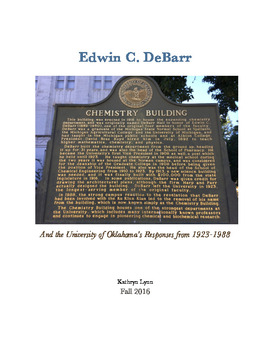| dc.creator | Lynn, Kathryn | |
| dc.date.accessioned | 2017-03-06T21:24:58Z | |
| dc.date.accessioned | 2021-04-14T15:26:13Z | |
| dc.date.available | 2017-03-06T21:24:58Z | |
| dc.date.available | 2021-04-14T15:26:13Z | |
| dc.identifier.uri | https://hdl.handle.net/11244.46/1264 | |
| dc.description | David W. Levy Prize finalist, Fall 2016 | |
| dc.description.abstract | In 1982, A University of Oklahoma student initiative strove to change a building's name after uncovering that Edwin C. DeBarr, for whom it was named, had been a grand dragon in the Ku Klux Klan. Then Oklahoma University President William S. Banowsky considered, and concluded in a Board of Regents meeting that the Chemistry Building should continue to be called DeBarr Hall. Among the president's reasons was this: "Should he be tried twice for the same shortcoming? After the passing of half a century, it is inappropriate to attempt to re-write history. 'The moving finger writes, and having writ moves on; nor all piety nor wit can lure it back to cancel half a line, nor all your tears wash out a word of it.'" Although he neglected to attribute the sentiment to Omar Khayyam, that argument might have had merit were it not for the fact that DeBarr was not being tried for the same shortcoming but a completely separate ideological issue that was simply anchored in the same historical event: the Board of Regents asking DeBarr to leave the University of Oklahoma. Two questions present themselves. Why did the Board of Regents fire DeBarr? And, why did the students object to DeBarr's name being used for the chemistry building? Unless those two answers are the same, then President Banowsky's logic in refusing the students' request was flawed. Were the students of 1982 outraged that DeBarr broke with University policy? That he was involved in politics and tried to mobilize his network to elect Robert Wilson as governor? No. They objected to honoring a member of the KKK when the current student body was diverse and opposed to the brutal racism associated with the Klan. DeBarr was never tried in court, but among his peers at the University, and the reasons for his termination in the 20s had nothing to do with racism that the students of the 80s repudiated. | |
| dc.format.extent | 3,370,133 bytes | |
| dc.format.medium | application/msword | |
| dc.relation.requires | Microsoft Word | |
| dc.subject | DeBarr, Edwin C., 1859-1950 | |
| dc.subject | University of Oklahoma -- Buildings | |
| dc.subject | David W. Levy Prize Finalist | |
| dc.title | Edwin C. DeBarr and the University of Oklahoma's reponses from 1923-1988 | |
| dc.type | Document | |
| dc.type | text | |
| dc.contributor.sponsor | Chappell, David | |
| dc.contributor.sponsor | Blackwell, Jacob | |
| dc.description.undergraduate | undergraduate | |
